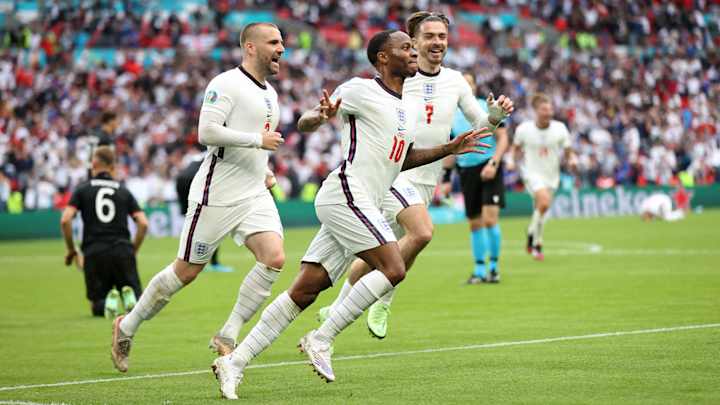Patience, Planning Pay Off for England, Southgate in Euro Elimination of Germany

In the end, what was extraordinary was how straightforward it all seemed. England, with its slow, methodical buildup, held Germany at arm’s length and, although it took an age to break through, it turned out Jogi Löw’s side had no response. Tuesday's 2–0 win in the Euro 2020 round of 16 at Wembley Stadium felt nervy because it took so long to arrive, but in truth it was all quite comfortable enough for the hosts.
England games are always played out with the baggage of history, particularly against Germany. The rivalry may be largely one-sided given Germany’s domination of games between the sides since 1966, but that does not mean there is not an extra edge, at least on the English side. And, of course, it is not just about football as the asinine England band, admitted to a game for the first time since COVID-19 restrictions first came into force, demonstrated with its endless repetitions of the theme to "The Great Escape."
Perhaps because of that sense of English failure, the previous game that dominated the buildup was not the World Cup final of 1966, when England won 4–2, but another meeting at Wembley, the semifinal of Euro 96, when England lost on penalties—and now-manager Gareth Southgate missed the decisive spot kick. And that perhaps obscured a key part of Southgate’s planning.
In 1966, England manager Alf Ramsey hit upon the 4-4-2 formation with which England would eventually win the World Cup in a friendly win in Spain in December 1965. He then hid the shape away for six months, bringing it out only for England’s final warmup match, away against Poland, when he could be sure very few people were watching. For the group stage, he used the more familiar 4-3-3, playing either Alan Ball or Martin Peters plus a winger. England was stodgy, but made it through, without conceding a goal, with two wins and a draw. Only then did Ramsey revert to the system he believed would win the tournament, playing Ball and Peters together in a 4-4-2.
After the last World Cup, Southgate moved away from his 3-4-3/3-5-2 hybrid to a more fluent 4-3-3. It brought more exciting football, notably the 3–2 away win over Spain in the Nations League, but also made England defensively vulnerable. So last year he reverted to the back three. With that shape, England beat Belgium, ranked No. 1 in the world, at Wembley, before surprisingly going back to the back four in March. But perhaps the switch to a three was always the plan, and Southgate was prepared to tolerate a dull group stage (two wins and a draw, and, for the first time since 1966, a group stage completed without concession) before unleashing his tournament formation.
If that was the plan, then it was at least in the abstract a good one. England too often in the past has been caught aiming for utopia, vainly chasing impossible dreams and so unable to adapt to specific opponents. But given Southgate had stressed how closely he had observed Portugal and France, winner of the last Euros and the last World Cup, respectively, and tried to model England’s play on their pragmatic approaches, there must have been a ripple of concern when both crashed out in the last 16. This has been an intoxicatingly and unexpectedly attacking-heavy tournament; it was impossible to avoid the thought that Southgate had been caught fighting the last war. Instead, he and his side eliminated the last remaining side from the tournament's vaunted Group of Death.
After the absurd thrills of Monday, this was back to more cautious fare. England overcame a nervous start to have marginally better of the first half, and only a slightly heavy touch from Harry Kane, who again looked off the pace on the whole, allowed Mats Hummels to make a vital tackle. Jordan Pickford spectacularly tipped over a Kai Havertz shot soon after halftime, but the game then resumed the familiar pattern of England slowly probing and getting nowhere fast.
But eventually the drip-drip of pressure told. Raheem Sterling surged forward and slipped a pass to Kane, who laid it off for substitute Jack Grealish, He waited to play a ball outside at the perfect moment for Luke Shaw, whose low cross was converted by Sterling for his third goal of the tournament. It was also, oddly, the first goal England had scored after the 62nd minute in its last 12 tournament games.
Yet for all the talk of control, there is always an element of chaos. A short Sterling pass resulted in Thomas Müller running clear on goal. His shot beat Pickford, but bobbled past the post—a remarkable let-off. And that was all England needed. With four minutes remaining, Shaw won possession on the halfway line and slipped in Grealish, whose cross was headed in by Kane as a wave of relief swept around Wembley.
England, at last, had won its first knockout game in normal time at the Euros. Ukraine awaits in the quarterfinal in Rome—and beyond that, the rest of the road leading to a potential first European trophy resides at home.
More Euro 2020 Coverage:

An accomplished author of multiple books, Jonathan Wilson is one of the world’s preeminent minds on soccer tactics and history.